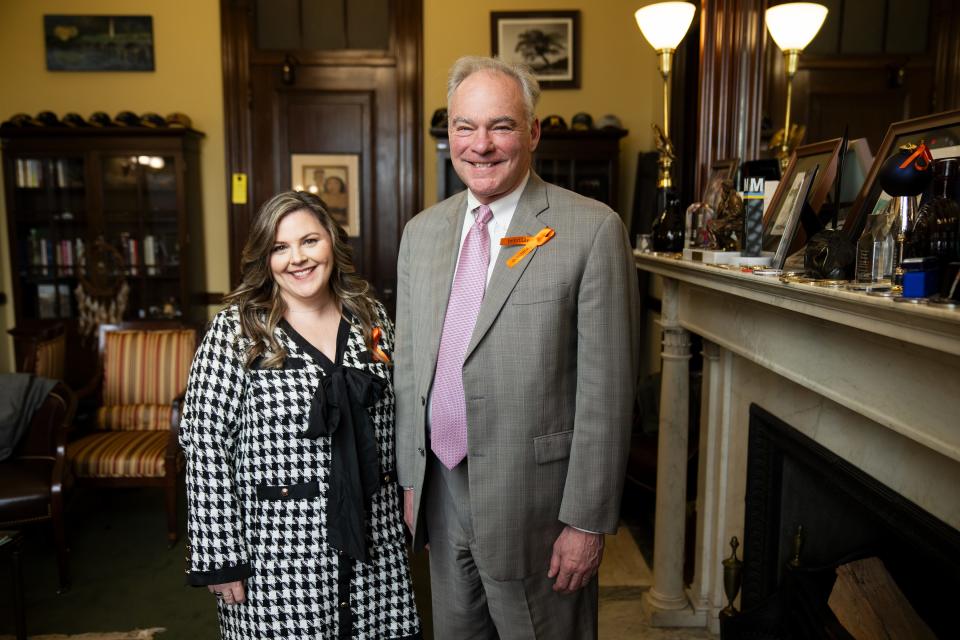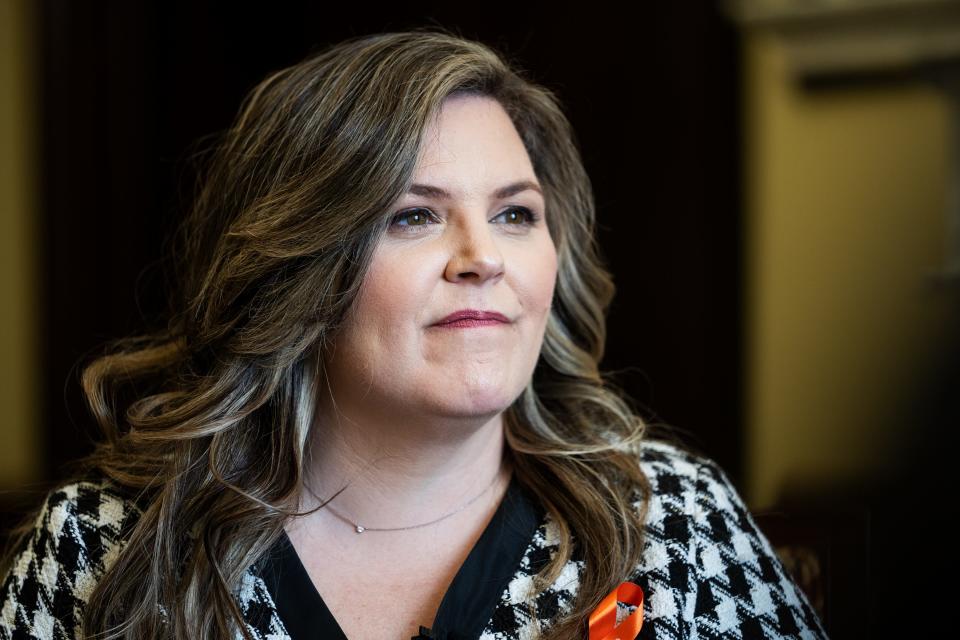Elizabeth Carr was the US's first baby born via IVF. Now, she's at the State of the Union
- Oops!Something went wrong.Please try again later.
- Oops!Something went wrong.Please try again later.
- Oops!Something went wrong.Please try again later.
WASHINGTON − Had Alabama Supreme Court's in vitro fertilization decision come down four decades ago, there's a chance Elizabeth Carr wouldn't be alive.
When the news hit last week that embryos created through in vitro fertilization are considered children under state law − pausing IVF treatment in Alabama clinics − Carr stopped in her tracks.
“I read aloud to my family what this ruling said and we just could not believe it,” Carr, the first baby born via IVF in the United States, told USA TODAY.
Carr's birth made newspaper headlines across the country. She even served as the cover photo for a LIFE Magazine issue with the headline “test-tube baby boom.”
On Thursday, as abortion and reproductive rights are spotlighted as top issues ahead of the 2024 election, Carr attended President Joe Biden's State of the Union as a guest of Virginia Sen. Tim Kaine, one of many Democrats looking to pass federal legislation to protect IVF.
More: State of the Union live updates: What time does Biden speak tonight, where to watch SOTU
Alabama legislators Wednesday night overwhelmingly passed legislation that provides civil and criminal immunity to fertility clinics and doctors for an embryo that dies during the IVF process. But Carr says it’s not enough.
“There’s a lot more work to do because it doesn’t address the question of what to do with these embryos and at what point we define life as beginning,” she said.
'Culmination of my worst fears'
![Mar 7, 2024; Washington D.C.,USA; Elizabeth Carr, the first IVF baby to be born in the U.S., speaks with Sen. Tim Kaine (D-Va.) in his office the afternoon before the State of the Union, where Carr will be attending as Sen. Kaine’s guest Thursday, March 7, 2024.. Mandatory Credit: Josh Morgan-USA TODAY ORG XMIT: USAT-873105 [Via MerlinFTP Drop]](https://s.yimg.com/ny/api/res/1.2/f4VW0fhJ8yW4LcLy.ucKZg--/YXBwaWQ9aGlnaGxhbmRlcjt3PTk2MDtoPTY0MA--/https://media.zenfs.com/en/usa_today_news_641/b7472667628a50b2a7fbf6273402887f)
Carr, now 42, was born in Virginia in 1981 after her parents struggled with getting pregnant.
They decided to travel from Massachusetts to Virginia, footing the high costs for the then-groundbreaking procedure.
Over 10 million people globally are born via IVF. In the U.S., the Centers for Disease Control and Prevention reports 2.3% of all infants conceived yearly used assisted reproductive technology, like IVF.
The medical procedure combines eggs and sperm in a lab dish before transferring the fertilized eggs into the uterus. One in six people globally struggle with infertility, according to the World Health Organization. More women are having babies in their 40s, especially in their mid-to-late 40s, according to 2023 data from the CDC, and some experts say it's because of increased access to artificial reproductive technology.
As part of the U.S. Supreme Court's ruling in 2022 that eliminated the constitutional right to abortion, the court returned the issue of abortion to states. But it also opened the door for states to ask questions about other aspects of reproductive care such as guaranteeing access to birth control pills or IVF − like the Alabama decision.
Carr said the decision was heartbreaking and made her immediately think about the individuals who would be impacted.
“This really was the culmination of my worst fears when the Dobbs decision came down,” Carr said. “This is what we all worried about happening. I was devastated, but I wasn’t surprised unfortunately.”
Kaine, who was 23 years old when Carr was born, recounted seeing her as a baby on the cover of LIFE magazine.
“It seemed like science fiction,” he said during remarks on the Senate floor.
Kaine told USA TODAY he's heard from constituents following Alabama's decision who face infertility struggles about the difficulty, cost and time spent during the IVF process. He described their stories as heartbreaking.
“If you say that’s what this is like already – pain and uncertainty and getting bad news along the way – what, we’re going to let legislators be cruel and make it worse?” he said. “We should be celebrating this. There’s 12 million Elizabeth Carrs walking around on the planet living their best lives.”
A need for federal protection
![Mar 7, 2024; Washington D.C.,USA; Elizabeth Carr, the first IVF baby to be born in the U.S., speaks with Sen. Tim Kaine (D-Va.) in his office the afternoon before the State of the Union, where Carr will be attending as Sen. Kaine’s guest Thursday, March 7, 2024.. Mandatory Credit: Josh Morgan-USA TODAY ORG XMIT: USAT-873105 [Via MerlinFTP Drop]](https://s.yimg.com/ny/api/res/1.2/a.ZY4wiRj6vMJpO0ZP4CiQ--/YXBwaWQ9aGlnaGxhbmRlcjt3PTk2MDtoPTY0MA--/https://media.zenfs.com/en/usa_today_news_641/ef65299848eab91c0c896fcb5ffbdb79)
Both Kaine and Carr point to the need for federal protection for IVF treatment.
Kaine has co-sponsored a bill led by Sen. Tammy Duckworth, D-Ill., that would provide IVF protections for both individuals and providers across the country.
“That will give people a sense of certainty − both providers and patients − a sense of certainty that if this is the way they want to build their family, they can safely do it in the United States,” Kaine said of the legislation dubbed the Access to Family Building Act.
The bill was brought to the Senate floor but blocked by Sen. Cindy Hyde-Smith, R-Miss. It needed unanimous consent to pass.
The bill is now in the Senate Committee on Health, Education, Labor and Pensions, where Kaine is a member. If it passes out of committee, it would move to the full Senate floor where it would need 60 votes to pass. It already has unanimous support from the upper chamber’s Democrats. Kaine said he is optimistic about its passage.
Following the Alabama decision, Republicans came out in support of IVF but wouldn't commit to supporting nationwide protections.
“I think the support for IVF among the American public – Democrat, Republican, Independent – is overwhelming,” Kaine said.
The Virginia lawmaker and Carr both said they were eager to see Biden encourage lawmakers to vote in favor of the Access to Family Building Act during the State of the Union Speech Thursday.
“Infertility does not care whether you are a Democrat or Republican,” Carr said.
Carr: 'Shame to undo progress'

Carr said she fears that the Alabama ruling could be a blueprint for other states making similar decisions moving forward.
“It very well could be which is terrifying for many going through or thinking about going through reproductive technologies to build their families," she said.
Legislators across the country have already started to discuss the future of IVF in the wake of the Alabama Supreme Court's decision. Lawmakers in Florida sidelined a bill that would have allowed civil lawsuits from the wrongful death of an "unborn child." In Tennessee, Republicans blocked legislation that would codify legal protections for birth control and in-vitro fertilization treatments, saying it was unnecessary.
Carr said she hopes her presence at Thursday's State of the Union shows how far assistive reproductive technology has progressed over the last four decades.
“It would be a shame to undo all the progress we’ve made,” she said, wearing an orange ribbon to represent the color for infertility awareness. “I just hope that this opens the door for many people to learn about these options for building their families."

This article originally appeared on USA TODAY: Elizabeth Carr, first IVF baby in the US attends State of the Union

